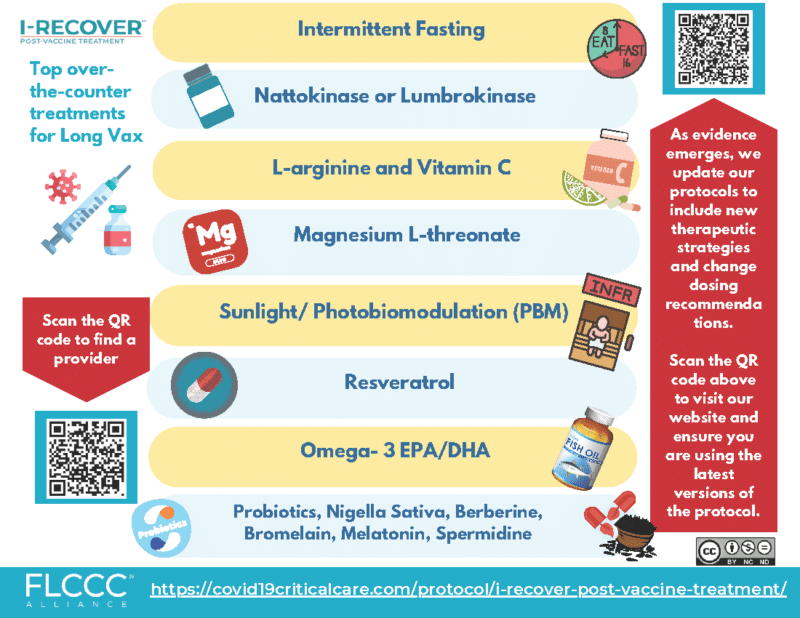Speakers: Dr. Paul Marik, Dr. Ryan Cole, Dr. Phillip Triantos
Summary
Are blood clots a side effect from the COVID “vaccines”? Join us as we examine the troubling connection between the COVID injections and serious health issues resulting from these mysterious blood clots. These clots have been shown to impact the brain, cause pregnancy complications, certain cancers, and lung collapse. This week, host Joyce Kamen is joined by Dr. Paul Marik, Dr. Ryan Cole, and radiologist Dr. Phillip Triantos. Together, they’ll explore the pathology of the blood clots linked to COVID shots. Learn what these unusual amyloid, white-colored blood clots are, and how they might affect health after the injections.
As a pathologist, Dr. Cole couldn’t avoid the so-called “rare cases” of blood clots linked to the COVID injections even if he tried.
If you’ve been following the FLCCC webinar lately, you’ll know this is a topic that comes up often. You may have seen a recent episode where we looked at the blood clots and the startling findings of embalmers. Today, we learn from another source of valuable insight: radiologist Dr. Phillip Triantos.
Along with FLCCC’s Dr. Paul Marik, the three experts agreed that the clotting phenomenon has not slowed down, despite a significant drop in the number of people getting the shots. In the webinar above, you’ll see them discuss data and photographic evidence that cannot be ignored.
Remember The AstraZeneca “Vaccine”?
Before we explore Dr. Triantos’ shocking analysis, let’s go back in time to April 2021. That was when both the AstraZeneca vaccine and the Johnson & Johnson (J&J) vaccine were suspended for the “rare side effect” of blood clots.
In April 2021, The European Medicines Agency (EMA) stated that unusual blood clots with low blood platelets should be listed as very rare side effects of the AstraZeneca vaccine. Some countries resumed use with updated guidelines. As of May 2024: The EMA announced that ‘the approval for Vaxzevria had been withdrawn “at the request of the marketing authorization holder’.”
The J&J injections were subject to similar scrutiny and were “paused” until April 2021. By May 2023, the Centers for Disease Control (CDC) declared the Janssen shots were “no longer available” and gave the order to dispose of any remaining doses.
The actions mentioned above sharply contrast with the “nothing to see here” stance of the same authorities who have been actively promoting COVID-19 injections, despite a significant rise in cases of thrombocytopenia, venous thrombosis, and other related conditions in recent years.
Radiological Insights on “Vaccine-Induced” Blood Clots
When people come to the doctor complaining of symptoms, they will often be sent to radiologists for various scans (x-ray, CT scans, MRI’s, etc.). Professionals like Dr. Triantos perform many of these scans every week to assist in diagnosing and treating disease and injury.
Dr. Triantos explained how advanced imaging techniques, like CT scans, are crucial for detecting blood clots in the vascular system that might not be immediately evident. These tools are essential, especially when patients present symptoms that could indicate deep vein thrombosis, pulmonary embolism, or other thromboembolic events.
The application of such imaging techniques has led to better diagnostics, and raises yet more questions about the widespread negative effects of mRNA and adenovirus vector injections used during the coronavirus pandemic period.
The images highlighted by Dr. Triantos reveal adverse effects that he believes are associated with use of the vaccines, including deep vein thrombosis and pulmonary events. Sadly, there are many other cases:
- Renal Cell Carcinoma Patient: The cancer reappeared and invaded the inferior vena cava (IVC) and aorta, extending to the right atrium after multiple vaccine doses.
- Case of Vena Cava Syndrome: Difficulty in venous return due to blockage.
- Patient with Pulmonary Embolism: Pulmonary clots were detected under microscopic examination.
- Lower Extremity Vein Clots: Clots identified in the veins of the lower extremities.
- Case of Aneurysms: Ultrasound images showed aneurysms.
He detailed a dizzying number of cases where people who received a COVID-19 injection and experienced a range of adverse events. There is no clear “winner” of which injections are the worst offenders, whether it be Pfizer-BionTech and Moderna Vaccines or their viral vector counterparts.
The Pathologist’s Perspective on COVID “Vaccines”
“In terms of the vascular conditions, it’s not slowing down. I think a lot of what we are seeing is auto-immune. I still think we have a lot to learn going forward about the causes.”
Dr. Cole has a special way of delivering grim news with a pleasant demeanor. Despite his soft-spoken nature, he is a resolute and experienced scientist. By examining tissue samples and correlating them with clinical presentations, pathologists are uniquely positioned to observe the direct effects of vaccines at the cellular level.
Dr. Cole pointed out the presence of what he describes as “franken proteins” in the blood—an anomaly that might be contributing to a heightened autoimmune response in vaccinated individuals.
“Why aren’t we hearing more about this?” Dr. Cole suggested that a combination of denial within the healthcare system and potential career risks for outspoken professionals might be stifling the discussion around these critical vaccine side effects.
How Can People Treat Potential Blood Clots from COVID “Vaccines”?
As the evidence mounts, it’s crucial to address how individuals can manage potential health risks associated with COVID-19 vaccines, particularly blood clots.
- Hydration and Nutrition: Staying hydrated and maintaining a balanced diet are fundamental steps to mitigate clot formation.
- Vitamin D Supplementation: Known as the “master conductor,” Vitamin D plays a vital role in regulating immune function and may help prevent adverse vaccine effects.
- Regular Movement: Encouraging moderate exercise can help improve blood flow and reduce the risk of clots.
- Use of Nutraceuticals: Dr. Cole recommends nutraceuticals like nattokinase and serapeptase, which have been noted for their fibrinolytic properties, helping to break down the abnormal proteins that may lead to clotting.
In addition to Dr. Cole’s advice, The FLCCC has outlined several strategies that can be adopted:
- I-Recover: Treatment guide focused on recovering from long vax syndrome.
- From A to Zinc: Your guide to the top nutrients, vitamins, and supplements for better health.
- Guide to Intermittent Fasting: Time restricted eating has been shown to help boost health in a variety of ways that will help those impacted after receiving the vaccine.
- OTC Long Vax Treatments: offers comprehensive advice for those experiencing side effects.
As FLCCC’s Kristina Morros pointed out in the webinar, the FLCCC website provides resources to help patients find healthcare providers who are potentially knowledgeable about these issues.

Why Aren’t We Hearing More About This?
At this point, we’ve evaluated compelling evidence of a range of seemingly common side effects associated with all types of COVID-19 injections:
- Risk of thrombocytopenia
- Risk of myocarditis
- Blood clots in the veins
- Blood clots in the arteries
- Risk of heart failure
Considering these injections did nothing to stave off COVID-19 infections, you’d think more medical professionals would be up in arms. As shocking as the evidence is, and as frequent and common as so many whistleblowers claim it is, we aren’t hearing about it nearly enough.
The dialogue between Dr. Cole and Dr. Triantos highlights a critical area of concern that requires more visibility. “This is not once a week, or once a month; this is every day,” remarked Dr. Triantos, emphasizing the frequency of these cases.
As more healthcare providers become aware of the potential link between COVID-19 vaccines and increased clotting risks, there is hope for better patient outcomes. Ensuring that patients are informed and that healthcare providers are vigilant about these risks is crucial.
The development of treatment protocols and preventive measures, alongside ongoing patient education, will be vital in mitigating these risks in the future.





